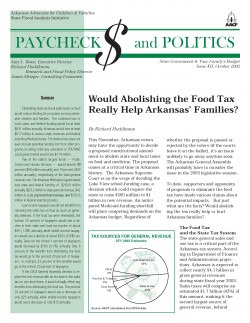
Eliminating state and local sales taxes on food would reduce funding for programs serving vulnerable children and families. The combined loss in local, state, and federal funding would be at least $631 million annually. Arkansas would lose at least $517 million in various state revenues and federal matching Medicaid funds. The federal loss does not even include potential funding lost from other programs, including child care, education or TEA/TANF. Local governments would lose $114 million.
Two of the state’s largest funds — Public School and Human Services — would absorb 49 percent ($98 million annually) and 19 percent ($39 million annually), respectively, of the total general revenue cuts. The Arkansas Medicaid program would lose state and federal funding of $260.8 million annually ($23.2 million in state general revenue, $42 million in soda pop/trust fund revenue, and $195.6 million in federal matching funds).
Low-income taxpayers would not benefit from removing the sales tax on food as much as generally believed. If the food tax were eliminated, the bottom 20 percent of taxpayers would see a decline in their state and local tax burden of about $99 (1.3%) annually, while middle-income taxpayers would see a decline of about $254 (0.9%) annually. Taxes for the richest 1 percent of taxpayers would decrease by $769 (0.1%) annually. Only 8 percent of the benefits from eliminating the food tax would go to the poorest 20 percent of taxpayers. In contrast, 33 percent of the benefits would go to the richest 20 percent of taxpayers.
If the 2003 General Assembly decides to replace the lost revenue with an increase in the sales tax on non-food items, it would virtually offset any benefits from eliminating the food tax. The poorest 20 percent of taxpayers would see a decrease of only $25 annually, while middle-income taxpayers would see a decrease of only $15 annually.
